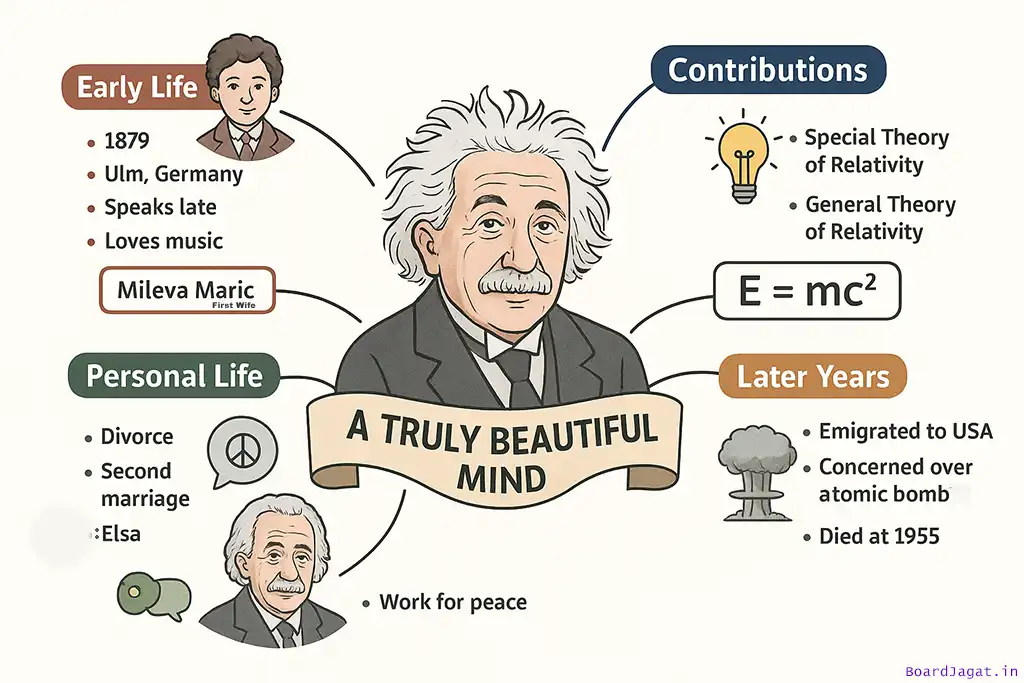Today, in this post, ‘A Truly Beautiful Mind Summary Class 9 English’, we’ll read the short and detailed summary of Class 9th NCERT English Beehive chapter 4, A Truly Beautiful Mind.
About the Lesson: A Truly Beautiful Mind
The lesson “A Truly Beautiful Mind” is a biographical piece on the life of Albert Einstein, one of the greatest scientists in history. It presents Einstein not only as a scientific genius but also as a human being with emotions, relationships, and a strong sense of responsibility toward humanity. The lesson traces his journey from childhood, where he was considered odd and faced difficulties in school, to his revolutionary contributions in physics, including the Theory of Relativity. It also highlights his personal struggles, his love for music, his political views, and his efforts to promote peace after World War II.
About the author
The lesson is taken from Beehive, the Class 9 NCERT English textbook, and is written in an informative narrative style rather than by a single well-known author. It has been compiled by the NCERT editorial team to present a simplified account of Einstein’s life for students. The main aim is to inspire readers by showing how a person with curiosity, determination, and humanitarian values can impact the world.
Short Sumary of A Truly Beautiful Mind
Albert Einstein (1879–1955) was a brilliant scientist known for the Theory of Relativity and the equation E = mc². He faced challenges in childhood, disliked strict schooling, and later became world-famous for his discoveries. Though troubled in personal life, he worked for peace and against war. He remains a symbol of genius and humanity—a truly beautiful mind.
A Truly Beautiful Mind Summary
Albert Einstein was born on 14 March 1879 in Ulm, Germany, and as a child, he appeared ordinary and even strange to some. He spoke late, repeated his words, and preferred playing alone. His mother thought his head was too big, and his playmates called him “Brother Boring.” He loved mechanical toys and music, especially the violin.
Einstein disliked the rigid discipline of his school in Munich, so he left it at the age of 15 and continued his education in Switzerland, a more liberal environment. At the university in Zurich, he met Mileva Maric, a bright student with whom he fell in love. They later married and had two sons, but eventually divorced.
Einstein graduated in 1900 but was initially unemployed. Later, in 1902, he worked at a patent office in Bern, where he developed his revolutionary scientific ideas. In 1905, he published groundbreaking papers, including the Special Theory of Relativity, introducing the famous equation E = mc², which explains the relationship between mass and energy. His General Theory of Relativity in 1915 brought him worldwide fame, confirmed by the solar eclipse of 1919.
He received the Nobel Prize in 1921. However, his personal life was troubled; he divorced Mileva and married his cousin Elsa. When the Nazis rose to power in Germany in 1933, Einstein emigrated to the USA. In 1939, fearing Germany might develop an atomic bomb, he wrote to President Roosevelt, leading to the Manhattan Project. After Hiroshima and Nagasaki, Einstein advocated peace and world government.
Einstein died in 1955 at the age of 76, remembered not just as a scientific genius but as a humanitarian and a visionary—a truly beautiful mind.

Read Also: A Truly Beautiful Mind NCERT Solutions
View all Chapter: NCERT Solutions for Class 9th English